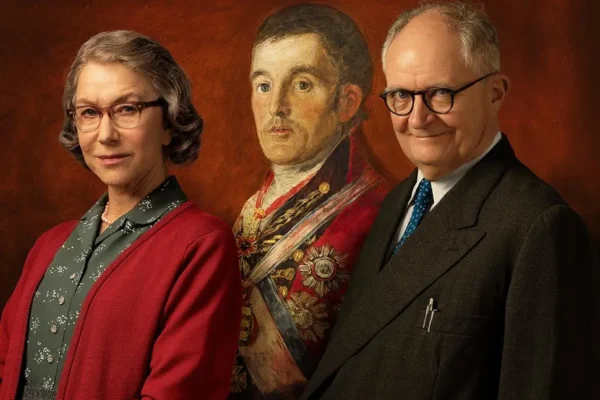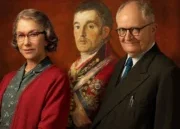
There is a tinge of sadness to watching The Duke when you realize that it became the swan song of British film and theater director Roger Michell who recently died aged 65... Michell’s work included a number of critically acclaimed productions at the National Theatre. His filmography included The Buddha of Suburbia , Hudson in Hyde Park, My Night With Reg which became a gay classic, plus his most commercial success, the rom-com Notting Hill
The Duke with a screenplay by Richard Bean and Clive Coleman is based on a very real incident/crime in 1961 when Kempton Cannon Bunton a disabled British pensioner stole Francisco Goya‘s painting Portrait of the Duke of Wellington from the National Gallery in London.
It reunites Michell with Oscar winner Jim Broadbent (Le-Weekend 2013) who stars as Bunton the cantankerous pensioner and long-time crusader for the rights of senior citizens. When the film starts we see him wound up by his latest campaign where he is incensed by a U.K. government license requirement that forced the elderly to pay a fee in order to own a TV set.
This is at the very same time that the British Government announces on TV about the National Gallery’s acquisition of a Goya painting of the Duke of Wellington worth 140,000 pounds It so incenses him that he decides to catch a train from Newcastle, a dreary, working-class northern city, to go London and steal the Goya. That such an ill-conceived amateur plan would ever work is a credit to the fearless and overly optimistic Bunton who never ever thought his plans through.
 The theft was never meant to enrich him at all but he wanted to hold the masterpiece as a hostage until he could pressure the government into making the telly a privilege, free for all.
The theft was never meant to enrich him at all but he wanted to hold the masterpiece as a hostage until he could pressure the government into making the telly a privilege, free for all.
With the clueless Authorities spinning to the media that the theft was obviously the work of a highly organized international crime syndicate we see Bunton with the help of his son Jacky (Fionn Whitehead) hiding the painting in the back of the wardrobe in their spare bedroom.
With all his local campaigns the eccentric Bunton is admired by many of his friends and colleagues, except by his grouchy, cynical, and long-suffering wife Dorothy so brilliantly played by Helen Mirren She sees through all his plans and schemes that have already landed him in prison for civil disobedience. All she wants is for him to get a regular job like everybody else.
This quintessential English comedy pokes fun at the class-structured society and naturally has us all rooting for the plucky working-class hero who so delights in challenging authority, especially when it is loaded against his class.
Broadbent and Mirren are a sheer joy in this delightfully entertaining movie that makes a fitting end to Michell’s fine body of work

